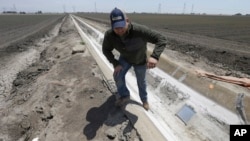A noted Israeli hydrologist is helping drought-stricken California cope with its water crisis.
Eilon Adar, director of the Zuckerberg Institute for Water Research at Ben-Gurion University in the Negev desert, came to Sacramento, California, recently for a conference on how Israel, no stranger to drought, could help California, now in the fourth year of an historic drought.
“We thought given California’s water situation, we’re in a very serious drought, and Israel’s advanced technology in this area, this would be the perfect sister city event to plan," said Sacramento Jewish Federation president Barry Broad, who helped organize the event.
"Bringing experts from Israel to tell us what are the things we can learn from Israel’s longer and more extensive history dealing with life in a permanently arid climate," he said.
In California, hundreds of thousands of people pay a flat rate for their water. That's the same price no matter how much water they use.
Adar says Israel treats water differently.
There, it is a national commodity with a value like oil and gas, governed by Israel’s Water Authority. The more you use, the more you pay.
“In my country, when I buy a unit of water to my house, I pay for the water as a commodity," he told the conference attendees. "I pay for the transmission, and I pay for the treatment of the water released later on from my house. And this, I think, is the key to success.”
The centralized water distribution system treats the water coming from homes and farms, and diverts it back to the National Water Company which is responsible for sending it throughout the country when it is safe to be used.
Israel was the first country to utilize drip irrigation. It switched from water-thirsty crops such as oranges to flowers for export. Israel has five desalination plants online, wastewater treatment centers around the country, and more than half of the water for its households, agriculture and industry is artificially produced.
Sivan Cohen, with the technology company Ayyeka, said another reason Israel is able to manage the crisis is that it monitors every drop. She said networks collect data which is used to make recommendations on how to treat and distribute water.
“Israel has 8 percent non-revenue water loss through their water infrastructure as opposed to lots of other states and countries," Sivan said. "California is around 16 percent to 30 percent, depending on the location. Some countries are as bad as 40 to 60 percent. That means about half of their water never makes it to the end user.“
Situation in California
California has yet to get its water crisis under control.
A desalination plant near San Diego is scheduled to come online soon. Meanwhile, Governor Jerry Brown has called for a 25 percent cut in water use state-wide. Also, a bond was passed in November setting aside money to help achieve long-term water sustainability.
Adar said the biggest obstacles to solving California’s long-term water problem, however, may have more to do with politics than technology, pointing out that thirsty cities in the southern part of the state often demand fresh water from the north be diverted south.
Darryl Steinberg, former president of California’s Senate and the lead negotiator on its recently passed water bond, said that must change.
“Truth is, we don’t have room for division here. It’s one state. There’s less water. There’s more people and we’re going to have to be much more aggressive and come together in a much more effective way over time, if we’re going to deal with this.”
Also, Adar says there are water laws dating back to the mid-1800’s that lay out a complicated patchwork of water rights without any centralized authority. During the Gold Rush era, property holders were granted ownership of subsurface as well as surface land.
They are not allowed to divert water from a stream passing through their property, but if there is water underground, a few meters from the stream, it’s considered to be privately owned for individual use. That also gives property owners the right to sell the water pumped from their land.
“I think the so-called owners of the water must find a way to collaborate in common management of this resource," Adar said. "It is too precious to leave it that way. And, I think this is the main problem why California reached this kind of water shortage. You have much more water per capita than Israel. Much more.”
Adar said farmers, property owners and water utilities must collaborate and save. He told the forum that Israel is available to help California, in fact, any country which wants its help, with its advanced technology, data and experience.
“Water is an essential commodity that I believe can breach between nations,” he said.










